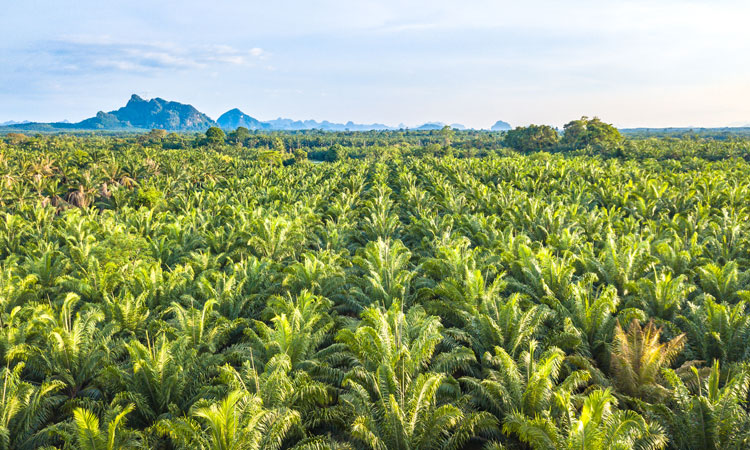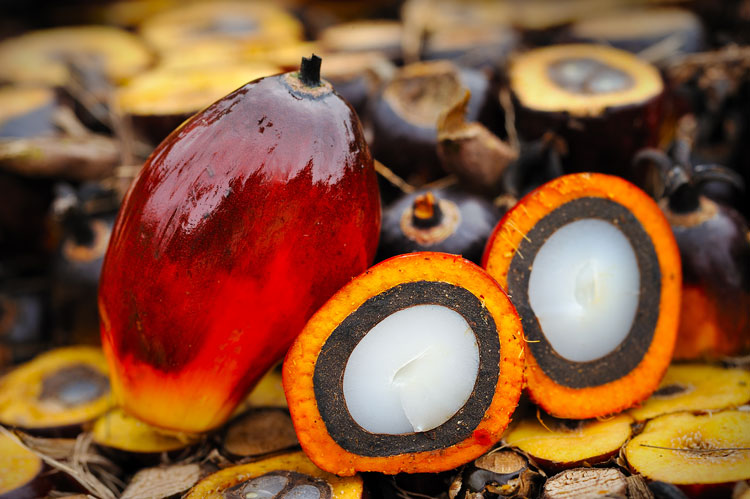Sustainable palm oil
- Like
- Digg
- Del
- Tumblr
- VKontakte
- Buffer
- Love This
- Odnoklassniki
- Meneame
- Blogger
- Amazon
- Yahoo Mail
- Gmail
- AOL
- Newsvine
- HackerNews
- Evernote
- MySpace
- Mail.ru
- Viadeo
- Line
- Comments
- Yummly
- SMS
- Viber
- Telegram
- Subscribe
- Skype
- Facebook Messenger
- Kakao
- LiveJournal
- Yammer
- Edgar
- Fintel
- Mix
- Instapaper
- Copy Link
Posted: 30 June 2021 | Gary Lewis | No comments yet
Gary Lewis, Head of Oils and Fats at KTC Edibles and president of The National Edible Oil Distributor’s Association, looks at palm oil, the issues surrounding sustainability, and what food companies can do to make the right purchasing decisions.


Palm oil is the most widely consumed vegetable oil on the planet – accounting for approximately 35 percent of total consumption. It’s found in almost 50 percent of all the packaged products available on our supermarket shelves, including foods, cosmetics, cleaning products and toiletries. Food manufacturers use it as an ingredient and food service businesses use it for frying. Palm oil is even found in animal feeds and used as a biofuel in many parts of the world.
It is cost effective and offers excellent cooking performance at a range of temperatures. The creamy texture, lack of odour and colour make it ideal for a wide variety of applications. Palm oil also acts as a natural preservative and can be used to extend the shelf life of products.
The problem with palm
However, there are some serious issues connected with unsustainable palm oil production.
Palm grows in the tropics and, historically, unsustainable farming practices have led to the widespread clearance of the world’s rainforests, especially in South-East Asia. These rainforests are some of the world’s most biodiverse areas. Clearing them for palm production has destroyed the habitat of endangered species, including the orangutan, pygmy elephant, Sumatran tiger and Sumatran rhino.
This loss of forest and the subsequent destruction of carbon-rich peat soil generates millions of tonnes of CO2 and other greenhouse gases, contributing to climate change. Inefficient and wasteful farming practices have further exacerbated the environmental impact of palm.
Clearing rainforests for palm oil has also led to the forcible displacement of indigenous communities; and across South-East Asia, palm production has been heavily linked to worker exploitation and child labour.
As a result, palm oil has been roundly condemned by many, with some companies in the UK going as far as to stop using it entirely and switching to alternative oils.
The bigger picture: palm oil vs. alternatives
Palm oil cultivation is the world’s single most efficient vegetable oil crop, producing more oil per acre of land than any other crop and accounting for 35 percent of the world’s vegetable oil, on just 10 percent of the land used to grow vegetable oil crops.


Fruit of the oil palm
In most cases, switching to an alternative, such as soybean, coconut, sunflower or rapeseed, only transfers the problems associated with palm production to other areas, or makes them worse. Other oil crops require between four and 10 times as much land, and consequently can have an even greater impact on the global issues of deforestation and habitat destruction.
The most recent 2018 report by IUCN (Oil Palm and Biodiversity) found that transitioning to other oil crops simply shifts deforestation to other regions – primarily from Asia to South America. It found that the net loss in biodiversity associated with using alternatives is significantly worse than that caused by palm oil.
The same report suggests that the most sustainable way forward in terms of biodiversity lies in palm; avoiding further deforestation by improving the planning of new palm plantations and by improving the management of forest.
Palm oil is a huge industry, and tens of millions of the world’s poorest people depend on palm production for their livelihoods. It is a vital crop for the GDP of emerging economies – and switching to other solutions could drive millions into extreme poverty.
With the global population increasing, supply of vegetable oil will need to grow to meet demand. Palm provides the best route to achieving this, as long as it is produced in a sustainable manner.
The rise of sustainable palm oil
Over the past 15 years, a huge amount has changed in the palm oil industry. Growing awareness and concern about the impact of unsustainable palm has transformed production methods, and the sector has made incredible strides towards improving its sustainability credentials.
The rise in sustainable palm production has been a global effort, driven by the combined efforts of governments, charities and organisations such as the Roundtable on Sustainable Palm Oil (RSPO). Working with industry, the RSPO has developed standards designed to improve sustainability across several key areas, and a number of certification schemes to ensure compliance.
As the sustainable palm oil movement has gathered momentum, the global palm industry has invested heavily in overcoming supply chain and logistical challenges to improve both traceability and availability. More recently, RSPO standards have been strengthened, and an increasing number of palm oil companies have embraced No-deforestation, No-peat and No-Exploitation policies (NDPE).
A decade ago, it was virtually impossible to get hold of sustainable palm oil. Today, RSPO-certified sustainable palm oil is available worldwide.
It has been a long journey and there is still more to be done, but today, palm oil can be a truly sustainable option. Now it is up to consumers, manufacturers, outlets and suppliers to make the right decisions when it comes to purchasing.
What is certified sustainable palm oil?
When we talk about sustainable palm oil, we mean palm oil that has been certified through an accredited scheme, such as the RSPO.
To achieve certification, producers must adhere to the RSPO Principles & Criteria for Sustainable Palm Oil Production. This is verified via periodic inspections and can be withdrawn at any time in case of infringement of the rules and standards.
Sustainable palm comes in three main classifications:
- Mass balance: certified sustainable oil mixed with non-certified oil (but only the portion of sustainable oil put in is sold as sustainable)
- Segregated: certified sustainable palm oil from multiple different sources
- Identity preserved: certified sustainable palm oil fully traceable back to a single source.
The route to 100 percent sustainable
The UK is already embracing sustainable palm. Today, more than 70 percent of the palm oil used across the country carries some form of sustainability certification, and from 2009 to 2018, UK purchases of RSPO-certified sustainable palm oil increased by 83 percent.
Most retail businesses and food manufacturers have already made the switch to sustainable palm oil. The foodservice industry is the last sector to engage, but the good news is that it has never been easier or more cost effective to do so. An increasing number of foodservice outlets are making sustainability a priority, and once the sector has fully embraced certified sustainable, achieving 100 percent usage in the UK looks increasingly possible.
At KTC, we are actively working towards achieving 100 percent sustainable palm in the UK. Our goal is to make segregated the minimum standard for palm oil. In our own business, we have already begun to phase out all non-sustainable products, and by 2022, we will only sell 100 percent certified sustainable palm oil.
We are also investing heavily in identity preserved (IP) solutions: the gold standard for palm oil. IP palm offers complete traceability, right back to the plantation. Until recently, IP palm oil was not widely available in the UK. In 2020, we launched Palmax IP, a fully traceable, (RSPO) certified palm oil for frying, sourced from Daabon, a global leader in sustainable agriculture.
The palm we use for our IP products is grown at Daabon’s own palm plantations in Northern Colombia, before being milled in Daabon’s own refinery. The company holds a wealth of sustainability accreditations and memberships, including Rainforest Alliance, Palm Oil Innovation Group and RSPO certification.
In 2021, we will expand the availability of IP palm oil products to include both palm olein and high oleic palm. High oleic palm oil offers significant performance benefits over standard palm, providing a real alternative to hydrogenated palm oil, which is being banned in the food service sector from April 2021.
From reality to reputation
The media has spent much of the last two decades focusing on the negative aspects of unsustainable palm production, without understanding the wider issue, or recognising the immense progress made in the development of sustainable palm oil.
Consumers have been sold a simplistic narrative: that palm oil is inherently bad. Changing this misconception will take time.
Thankfully, the narrative is already being challenged on multiple fronts. Major government initiatives, environmental charities, NGOs and conservation organisations across the world, including UK Sustainable Palm Oil Roundtable, NEODA, WWF UK, Conservation International, Jane Goodall Institute and The Orangutan Land Trust, are championing the sustainable palm movement.
The world has started to see that the solution lies in the promotion of sustainable palm oil, and through initiatives, such as Chester Zoo’s Sustainable Palm Oil Challenge, are actively looking to drive further adoption in the UK and overseas.
Over time this message will trickle down; and as consumers become more conscious about the wider ethical and sustainability issues surrounding palm, opinion will start to shift.
The future for palm is positive.
References:
- https://portals.iucn.org/library/node/47753
- https://www.chesterzoo.org/what-you-can-do/our-campaigns/sustainable-palm-oil/
- https://www.efeca.com/uk-sourcing-sustainable-palm-oil-initiative/
- https://rspo.org/certification
- https://palmoilscorecard.panda.org/
- https://www.wwf.org.uk/updates/8-things-know-about-palm-oil
- https://www.daabonuk.com/
- https://www.ktcoilsandfats.co.uk/sustainability
Gary Lewis is Head of Business Development, oils & fats at KTC (Edibles) Limited, President and Chairman of the National Edible Oils Distributors Association (NEODA), and a member of the UK Sustainable Palm Oil Roundtable.









